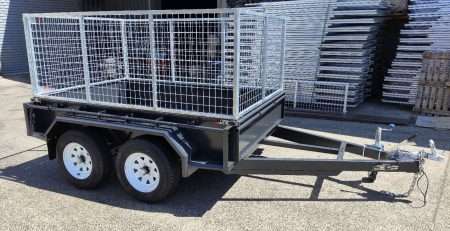
Auto Transport Trailer Rental: Everything You Need to Know

Key Highlights
- Renting an auto transport trailer is a convenient and affordable way to transport vehicles or other bulky items.
- There are different types of auto trailers available, including car trailers and wide trailer rentals.
- Before renting an auto transport trailer, you should take into account factors such as your vehicle’s towing capacity and the size of the vehicle you need to transport.
- The rental process for auto transport trailers usually involves reserving the trailer online and providing the necessary documents.
- It is critical to properly prepare your vehicle for transport by adhering to a checklist and ensuring safety measures are in place.
- Carefully load and unload the vehicle or trailer to prevent any damage.
- When driving a loaded trailer, it is important to follow driving tips for safety and comply with legal requirements.
- Pricing for auto transport trailer rentals can vary, and it is important to understand the rental costs, insurance options, and any additional charges.
- FAQs about auto transport trailer rentals include questions about international shipping, car trailer capacity, and tying down a car on a trailer.
Introduction
If you need to transport a vehicle or other large items, renting an auto transport trailer can be an excellent solution. Auto transport trailer rentals provide a convenient and cost-effective way to move small vehicles, commercial goods, or construction material. Whether you are relocating, moving bulky machinery, or simply needing to transport your car, renting an auto transport trailer can make the process much easier.
Understanding the process of renting an auto transport trailer can help ensure a smooth experience and avoid any potential issues. This blog will provide you with everything you need to know about auto transport trailer rentals, including the types of trailers available, how to choose the right one, the rental process, vehicle preparation, loading and unloading procedures, safety and compliance on the road, pricing and payment options, and frequently asked questions.
By the end of this blog, you will have a comprehensive understanding of auto transport trailer rentals and be well-equipped to make the right choice for your transportation needs. So let’s dive in and explore the world of auto transport trailer rentals!
Understanding Auto Transport Trailer Rentals
Auto transport trailer rentals, also known as trailer hire, provide individuals and businesses with the ability to transport vehicles or other large items without the need for specialised equipment or vehicles. Attaching these trailers to a suitable tow vehicle, like a 4WD or similar vehicle, provides a safe and efficient method of moving goods from one location to another. Car trailers, specifically designed for transporting small vehicles, are a popular option for individuals who need to move their cars or other light commercial vehicles.
What are auto transport trailers?
Auto transport trailers, also known as car trailers or tow trailers, are specially designed trailers that facilitate the transportation of vehicles from one location to another. These trailers typically feature a low deck and multiple tie-down points to secure the vehicle during transport. Depending on the type and size of the vehicle under transport, they come in various sizes and configurations.
One popular type of auto transport trailer is the dual-axle car trailer, which offers a higher load capacity than standard car trailers. This type of trailer requires a tow vehicle with a towing capacity of at least 3500 kg. People commonly use car trailers to transport small vehicles like cars, SUVs, and light commercial vehicles. They are a popular choice for individuals who are moving or need to transport their vehicles for other reasons.
Types of Auto Transport Trailers Available
When it comes to auto transport trailer rentals, there are several types of trailers available to suit different transportation needs. Specifically designed for transporting small vehicles, the car trailer is a common type. Car trailers are a great option for individuals who need to move their cars, SUVs, or light commercial vehicles. These trailers feature a low deck and multiple tie-down points to secure the vehicle during transport.
The wide trailer rental is another type of auto transport trailer. Designers create wide trailers to accommodate wider vehicles or bulky items that might not fit on a standard car trailer. These trailers have a larger width, allowing for the transportation of large vehicles or machinery.
Whether you need to transport a car, SUV, or other wide vehicle, an auto transport trailer is available for hire to meet your specific needs.
Choosing the Right Auto Transport Trailer
Choosing the right auto transport trailer is critical to ensuring your vehicle’s safety and successful transport. Before renting a trailer, consider factors such as your vehicle’s towing capacity and size. is important to choose a trailer that can safely accommodate the weight and dimensions of your vehicle. Additionally, consider the type of trailer that best suits your needs, whether it is a car trailer or a wide trailer. By carefully considering these factors, you can select the right auto transport trailer for your specific requirements.
Factors to consider before renting
Before renting an auto transport trailer, there are several factors that you should take into consideration. First, you need to determine your vehicle’s towing capacity to ensure it can safely tow the trailer. You can usually find this information in your vehicle’s owner’s manual or by contacting the manufacturer. Additionally, consider the size and weight of your vehicle. If you have a small vehicle, a standard car trailer may be suitable. However, for larger or commercial vehicles, a wide trailer with a higher load capacity may be necessary. Finally, consider the type of vehicle you will be towing. If you have a 4WD or a similar vehicle, it should be able to handle towing a trailer. Taking these factors into account will help you choose the right auto transport trailer for your needs.
comparing different trailer models
To help you make an informed decision when choosing an auto transport trailer, it is important to compare different trailer models. By comparing the features, specifications, and load capacities of different trailers, you can find the one that best suits your needs. Here is a comparison table of two popular trailer models:
| Trailer Model | Car Trailer | Wide Trailer |
| Deck Size | Standard | Larger |
| Load Capacity | Up to 1200kg | Higher load capacity |
| Suitable for | Small vehicles | |
| Towing vehicle Requirements | 4WD or similar | Higher towing capacity is required |
Comparing different trailer models will give you a clear understanding of their features and help you choose the right trailer for your specific transport requirements.
The Rental Process Explained
Renting an auto transport trailer is a straightforward process that can be done online or by contacting a rental company. The rental process typically involves reserving your trailer online and providing the necessary documents. To reserve your trailer online, you will need to provide your contact information, rental dates, and any additional equipment or accessories you may need. Once your reservation is confirmed, you will need to provide the required documents, such as your driver’s licence and proof of insurance. These documents are necessary to ensure that you are eligible to rent the trailer and comply with legal requirements. By following these steps, you can easily rent an auto transport trailer for your vehicle transportation needs.
How to Reserve Your Trailer Online
Reserving your auto transport trailer online is a convenient and efficient way to secure your rental. To reserve your trailer, start by visiting the rental company’s website. On the website, you will find a reservation form where you can enter your contact information, rental dates, and any additional equipment or accessories you may need. Make sure to provide accurate information to avoid any issues during the rental process. Once you have filled out the reservation form, review the terms and conditions, and proceed to confirm your reservation. You may be required to pay a reservation deposit, which will be deducted from the total rental cost. After confirming your reservation, you will receive a confirmation email with the details of your rental. Keep this email for reference and ensure that you have the necessary documents ready for pickup. By reserving your auto transport trailer online, you can save time and secure your rental in advance.
Documents Needed for Rental
When renting an auto transport trailer, you will need to provide certain documents to finalise the rental process. These documents are necessary to ensure that you are eligible to rent the trailer and comply with legal requirements. The specific documents you will need may vary depending on the rental company, but typically include:
- Driver’s Licence: You will need a valid driver’s license to verify your identity and ensure that you are legally allowed to operate a trailer.
- Proof of Insurance: Most rental companies require proof of insurance to cover any damages or accidents that may occur during the rental period. Make sure to check with the rental company about their insurance requirements.
- Credit Card: A credit card is usually required to secure the rental and cover any additional charges or damages that may occur during the rental period.
- Additional Documentation: Depending on the rental company, you may be asked to provide additional documentation, such as proof of address or a utility bill.
It is important to have these documents ready before picking up your rental trailer. This will ensure a smooth rental process and help you avoid any delays or issues.
Preparing Your Vehicle for Transport
Before loading your vehicle onto the auto transport trailer rental, ensure it is in optimal condition. Check tyre pressure, secure all loose items inside the car, and remove any personal belongings. Verify that the vehicle does not exceed the trailer’s weight capacity to prevent any issues during transport. Additionally, it’s advisable to document any existing damage for insurance purposes. Following these steps will help guarantee a smooth and safe transportation process for your vehicle.
Checklist for Vehicle Preparation
Inspect tyres for proper inflation. Secure any loose items within the vehicle. Check that all fluids are at appropriate levels. Ensure the battery is charged and in good condition. Test the brakes and lights. Adjust the mirrors for optimal visibility. Remove any personal belongings. Verify that the vehicle is in neutral. Follow the weight limits specified by the trailer hire company.
Safety Measures and Protocols
Before hitting the road, it’s crucial to adhere to safety measures and protocols when using auto transport trailer rentals. Always ensure your tow vehicle meets the towing capacity required by the rental trailer. Secure all items in the trailer properly to prevent shifting during transport. Familiarise yourself with the trailer’s maximum weight capacity and follow the recommended guidelines for a safe journey. Regularly check that the trailer is in good condition, including its tyres and brakes, before embarking on your trip.
Loading and unloading procedures
Step-by-step loading ensures safe transportation. To start, align your vehicle with the trailer and slowly drive it on, securing it properly. Always adhere to weight limits and distribution recommendations to prevent accidents. Unloading involves cautiously driving off the trailer and removing any securing devices. Prioritise safety by double-checking connections before hitting the road. Efficient loading and unloading procedures guarantee a smooth transport process for both your vehicle and others on the road.
A Step-by-Step Guide to Loading Your Vehicle
Begin by aligning your auto transport trailer with a suitable loading area. Ensure the trailer and tow vehicle are on level ground for stability. Lower the trailer’s ramps carefully and securely. Adjust the ramps as needed to accommodate the vehicle’s dimensions. Slowly drive the vehicle onto the trailer, positioning it centrally to distribute the weight evenly. Secure the vehicle with tie-down straps or chains, following the trailer’s guidelines. Double-check all connections before transporting your vehicle for enhanced safety and peace of mind.
Tips for Secure Unloading
When unloading your vehicle from an auto transport trailer, ensure the area is clear and spacious. Engage all safety measures and chock the wheels to prevent any movement. Utilise ramps securely, and unload slowly and steadily. Take caution while driving the vehicle off the trailer and ensure a smooth exit. Double-check the trailer for any belongings left behind before moving the trailer. Adhere to weight limits, and if unsure, seek professional guidance or assistance. These tips can enhance the unloading process and ensure a safe transition.
On the Road: Safety and Compliance
Driving with a loaded trailer requires caution and adherence to legal standards. Ensure your tow vehicle can handle the weight of the trailer and its contents. Follow all speed limits and road regulations, especially when manoeuvring or changing lanes. Stay informed about the towing capacity of your vehicle and the maximum weight capacity of the trailer. Be prepared for emergency situations and comply with all safety guidelines to make your journey smooth and secure. Remember, safety is paramount when transporting vehicles.
Driving Tips with a Loaded Trailer
Maintain a moderate speed and avoid sudden manoeuvres to ensure stability when driving with a loaded trailer. Allow for increased braking distances, and use your mirrors frequently to monitor surrounding traffic. Distribute the weight evenly within the trailer to prevent swaying and maintain control. Be mindful of sharp turns and inclines, adjusting your speed accordingly. Familiarise yourself with the towing capacity of your vehicle and adhere to legal speed limits for safer travel with your loaded trailer.
Legal Requirements and Compliance
Legal requirements and compliance are essential when using an auto transport trailer rental. Make sure to adhere to the towing capacity of your vehicle and the maximum weight capacity of the trailer. Familiarise yourself with local laws in Australia, as regulations may vary. Ensure that your trailer meets all necessary specifications and safety standards to avoid any legal issues while on the road. Stay informed about any refund policies, insurance requirements, and additional charges to maintain compliance throughout your rental period.
Pricing and payment options
Understanding the pricing and payment options for auto transport trailer rentals is crucial. Rental costs vary based on factors like duration and trailer type. Insurance and additional charges may apply, so it’s essential to review all fees upfront. Payments are usually processed through reliable channels, offering convenience and security. Ensure you understand the terms regarding refunds and any penalties for late returns. Familiarise yourself with the accepted payment methods, making the process smooth and hassle-free.
Understanding rental costs
When considering auto transport trailer rental costs, it’s essential to factor in the duration of the hire and the type of trailer required. Prices may vary depending on the model and specifications of the trailer. Additional charges could apply for accessories or insurance coverage. Be aware of any refund policies and deposit requirements set by the rental company. Understanding the breakdown of costs upfront will help you budget effectively for your transportation needs. Make sure to enquire about any hidden fees or extra charges before finalising your rental agreement.
Insurance and additional charges
When considering auto transport trailer rentals, it’s essential to factor in insurance and any additional charges that may apply. Insurance options vary among providers, so it’s crucial to understand the coverage levels offered and any potential deductibles. Additionally, be aware of any extra fees that could be incurred during the rental period, such as late return charges or cleaning fees. Taking the time to review insurance policies and potential additional costs upfront can help you make an informed decision when selecting a trailer rental service.
Conclusion
Auto transport trailer rentals provide a convenient solution for transporting vehicles. Understanding the types of trailers available and choosing the right one is crucial. Consider factors like safety measures, compliance, and pricing options. Prepare your vehicle correctly, load it securely, and follow driving tips for a safe journey. Ensure you have the necessary documents and insurance coverage. Frequently asked questions address concerns about international shipping, damages during transport, trailer capacities, and regulations. Renting an auto transport trailer provides flexibility and ease in moving vehicles, making it a practical choice for various transport needs.
Frequently Asked Questions
Can I rent an auto transport trailer for international shipping?
Auto transport trailers are typically rented for domestic use within a country’s borders. International shipping requires specialised services due to customs, regulations, and logistics. Consider international shipping companies for this purpose.
What happens if the vehicle is damaged during transport?
If your vehicle is damaged during transport, reputable rental companies usually have insurance coverage to handle such situations. It’s essential to carefully review the rental agreement and insurance policy for details on the claims process and coverage options.
How much can a car trailer carry?
A car trailer can typically carry up to 3,000 to 10,000 pounds, depending on the type and size. It’s essential to know your vehicle’s weight and the trailer’s capacity for a safe transport experience.
What size are car carrier trailers?
Car carrier trailers typically come in various sizes, ranging from 16 to 53 feet in length. The size you choose will depend on the type and number of vehicles you plan to transport.
How do you tie down a car on a trailer?
Securing a car on a trailer involves using sturdy straps and tie-down points. Place the vehicle in the centre of the trailer and securely fasten each wheel with ratchet straps, ensuring they are tight and stable to prevent any movement during transport.
How wide is a car trailer?
A standard car trailer is typically 6 to 8.5 feet wide, accommodating most vehicles comfortably. Ensure the width of your car trailer meets legal requirements for safe transport.
What features should you look for in an auto transport trailer rental?
When choosing an auto transport trailer rental, consider features like weight capacity, trailer dimensions, and loading and unloading mechanisms. Safety features such as brake systems and tie-down points are crucial. Additionally, look for trailers with good customer reviews for reliability.
What are the benefits of renting an auto transport trailer?
Renting an auto transport trailer offers convenience in moving vehicles across long distances, saving time and mileage on your own vehicle. It provides a cost-effective solution compared to hiring professional drivers. Additionally, you have control over the transportation process.
What is the average cost of renting an auto transport trailer, and what factors can affect the price?
The average cost of renting an auto transport trailer varies between $50 and $150 per day. Factors influencing the price include trailer size, distance travelled, rental duration, and additional services like insurance. Understanding these factors helps in estimating the overall cost accurately.
Are there any specific regulations or requirements for using an auto transport trailer rental?
When using an auto transport trailer rental, there are specific regulations and requirements to follow. These may include weight limits, licencing, insurance, and safety protocols. Adhering to these ensures a smooth and legal transportation process.
How far in advance should you book an auto transport trailer rental?
To secure an auto transport trailer rental, booking in advance is recommended. Factors like high demand or specific trailer preferences may affect availability. Aim to reserve your trailer at least 2–4 weeks before your desired pickup date.
Auto Transport Trailer with Uhaul Pickup?
Renting an auto transport trailer with U-Haul for your vehicle? Learn about the convenience of U-Haul pick-up services and how they can streamline your auto transport needs. Find out more about this efficient option.
Recommended trailer options only for towing behind SUVs?
Looking to tow behind an SUV? Opt for lightweight, single-axle trailers. Enclosed or open-top trailers are popular choices. Consider factors like weight capacity and aerodynamics for a safe towing experience.
Large One-Way Trailer Recommendations?: r/movin
What makes Cash for Cars transport your car fast?
Cash for Cars offers expedited transport services utilising specialised trailers and efficient logistics. With a focus on quick turnarounds, trained professionals handle the process swiftly, ensuring your vehicle reaches its destination promptly and safely. Experience rapid car transport with Cash for Cars.
What’s the best SUV to lease?
The best SUV to lease depends on your needs and preferences. Consider factors like size, fuel efficiency, and the features offered. Compact SUVs like the Honda CR-V or Toyota RAV4 are popular choices for versatility and reliability.
How can I rent a car to tow a trailer?
To rent a car to tow a trailer, contact reputable rental companies specialising in auto transport. Ensure the vehicle meets towing requirements and has the necessary documents ready for the rental process. Compare trailer models, consider costs, and understand insurance options before making a reservation online.
Author
I am Rahatul Ashiq Tamal. Another author of Muscle Trailers. Muscle Trailers is a well-known trailer brand in Sydney, Melbourne & Adelaide

How to Mount a Spare Tire on Your Trailer: A Simple Step-by-Step Guide
Trailer service centers receive over 1 million phone calls and 1.3 million emails each year about trailer maintenance problems....

How to Fix RV Roof Leaks: Simple Roof Leak Detection Guide for Beginners
Did you know DIY RV roof repairs can cost under $50? But undetected leaks could lead to substantially higher repair...

Starting a Food Truck Business in Australia: From Trailer Selection to Launch
The Australian mobile food market has evolved into a billion-dollar industry. This makes a food truck...
